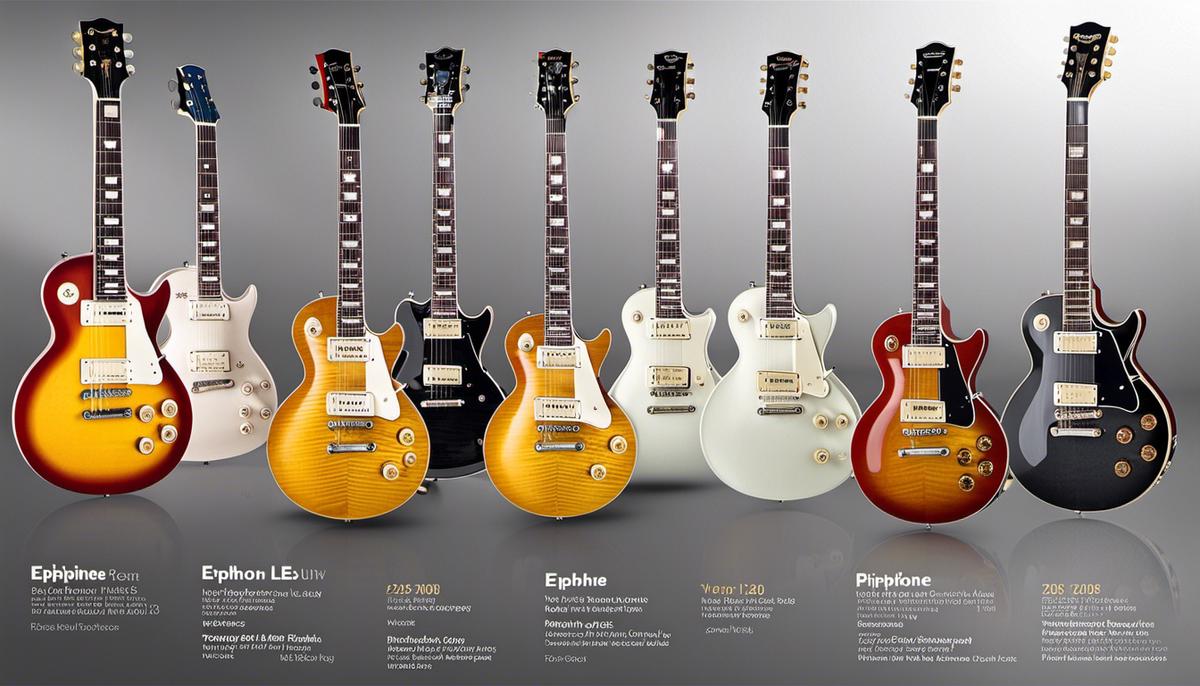
For those entranced by the guitar realm, the name Epiphone Les Paul needs no introduction. These iconic guitars typify the fusion of rich history with remarkable craftsmanship and the epitome of tone and playability. Whether you’re an experienced guitarist seeking a new sonic partner or a neophyte embarked on a musical journey, the right instrument can make a crucial difference. This comprehensive guide unpacks the legacy of Epiphone Les Paul guitars, examines various models, offers insights into pricing, shares reliable avenues for purchase, and provides valuable maintenance tips.
History of Epiphone Les Paul Guitars
A Look Into the Rich History of Epiphone Les Paul Guitars
Epiphone Les Paul guitars share a deep-rooted history with both the music maestro, Les Paul, and the acclaimed manufacturer, Epiphone. Born in 1915, Les Paul was renowned for his creation of one of the first solid-body electric guitars, a revolutionary design that propelled the growth of rock and roll music.
The tale of Epiphone unfolds back in the late 19th Century when it was a Greek violin and lute manufacturer. After migrating to the USA and experiencing various transitions in ownership and leadership, it merged with Gibson, a guitar manufacturing powerhouse, in the 1950s. This merger was a strategic move for Gibson looking to extend its range, while Epiphone needed financial stability.
Consequently, the partnership between Gibson and Les Paul set the stage for the introduction of Epiphone Les Paul guitars in the early 1950s. The concept was to produce an affordable range of Epiphone-branded guitars that embodied the superior craftsmanship reminiscent of Gibson’s distinguished guitars.
The brand overhauled its production systems in the 1980s, ushering in a new era of advancements for the Epiphone Les Paul array. The company outsourced a sizeable chunk of its manufacturing to Asia, primarily Korea and China, while assuring the quality remained unrivalled due to stringent quality control and adherence to Gibson’s quality standards.
Through the years, the Epiphone Les Paul range has been fine-tuned to meet diverse needs, providing features suitable for various musicians’ genres and skillsets. The guitars saw significant upgrades, mainly in the pickups, hardware, and looks, targeting enhanced tone, user-friendliness, and visual charm.
Furthermore, Epiphone released a broad spectrum of Les Paul models, reflecting the precise specifications of celebrity musicians’ guitars, hence the “signature” models. This range of diversity extends to the Epiphone Les Paul Standard, Studio, Custom, Classic, and Junior models. Each offering unique features and finishes at their respective price points.
In essence, Epiphone’s Les Paul guitar lineage explores a fascinating journey of growth, innovation, and adaptation while never compromising on quality and affordability. These core values, coupled with each model’s unique specifications, form the heart of Epiphone Les Paul’s appeal to musicians worldwide and are important things for potential buyers to consider.
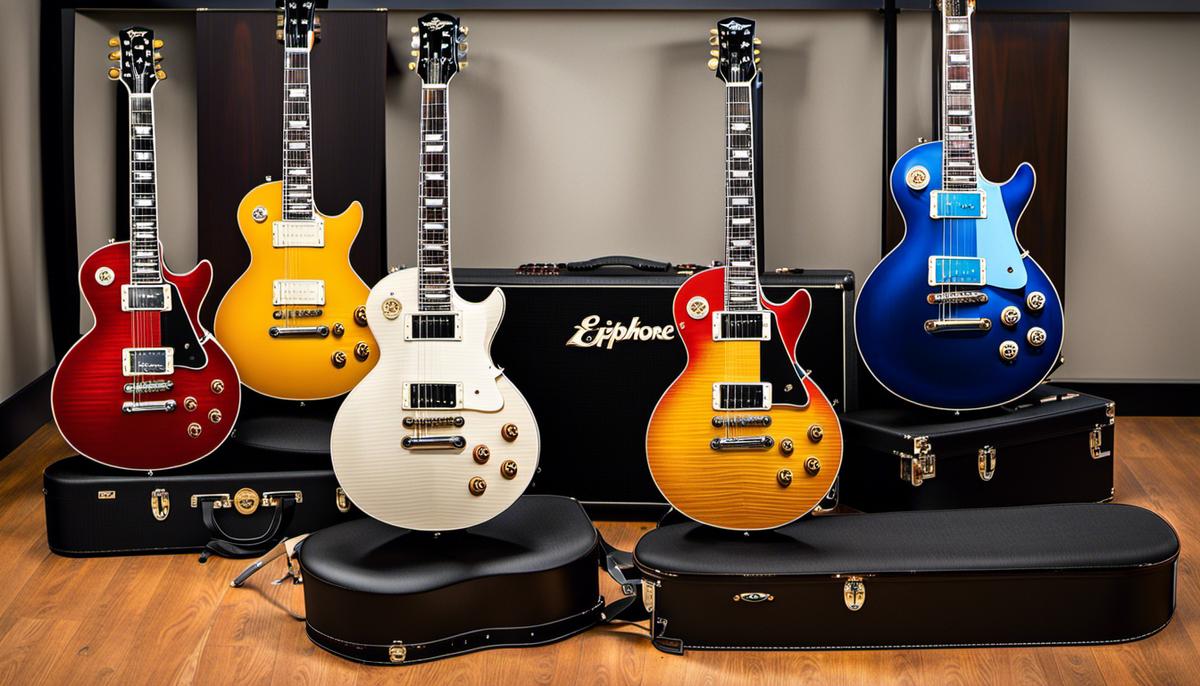
Different Models of Epiphone Les Paul Guitars
Delving into the Epiphone Les Paul Standard
Standing as the hallmark of the Epiphone Les Paul series, the Epiphone Les Paul Standard is seen as the go-to guitar model from this family. Characterized by its classic double humbucker pickup configuration, this guitar caters proficiently to musical novices and veterans alike, spanning across a myriad of musical genres such as funk, blues, and heavy rock. Designed with a mahogany body, the Standard delivers a more profound and resonant sound, which complements the livelier tone of its maple veneer top.
Epiphone Les Paul Custom Pro
One step above the Standard model is the Epiphone Les Paul Custom Pro, best recognized for its distinctive white finish and gold hardware. This model stands out for its ProBucker pickups with coil-splitting capabilities, providing even more tone options. The mahogany body and neck, with ebony fingerboard, give the Custom Pro a rich and deep tonal quality, enhanced by its high sustain.
Epiphone Les Paul Studio
The Epiphone Les Paul Studio provides beginning guitarists with an affordable entry-level Les Paul option that doesn’t skimp on quality. It also features a two humbucker pickup configuration but at a fraction of the cost. Lighter and more simple in design due to the lack of body binding and fretboard inlays, the Studio model is a workhorse instrument designed for straightforward functionality.
Epiphone Les Paul Special II
If budget is your main concern, the Epiphone Les Paul Special II is the most affordable model of the Les Paul series by Epiphone. It has a simpler design, with a bolt-on neck as opposed to the set necks of the more expensive models, and a thinner body. Despite its low price, the Special II is known for its great sound and makes a great choice for beginners.
Epiphone Les Paul Tribute Plus
For those looking for high-end features in an Epiphone, the Les Paul Tribute Plus is the go-to model. It boasts Gibson USA ’57 Classic pickups that provide vintage-style tones, along with push/pull series parallel switching for greater tonal versatility. Another premium feature is its hard maple capped body, a detail usually only found on the original Gibson models. Additionally, the added bonus of a hard case offers value to players who frequently travel with their instrument.
Epiphone Les Paul Ultra III
The Epiphone Les Paul Ultra III is the most unique of all the models, bridging the gap between traditional Les Paul designs and modern technology. The Ultra III is equipped with a “Nanomag” pickup at the end of the fingerboard that captures the string vibrations at their most harmonic point. By blending the output of the Nanomag with the traditional humbuckers, you can get an impressive range of tones. Furthermore, this model features a USB output for direct recording to a computer.
Various Needs Served by Different Epiphone Les Paul Models
When it comes to the Epiphone Les Paul series, each model caters to a unique set of needs. Keeping in mind one’s budget, preferred playing style, and the features you value most, choosing a model can be an intuitive process. Epiphone Les Paul comes with the reputability of delivering top-notch instruments akin to their Gibson equivalents, only with an advantage—a more customer-friendly price point.
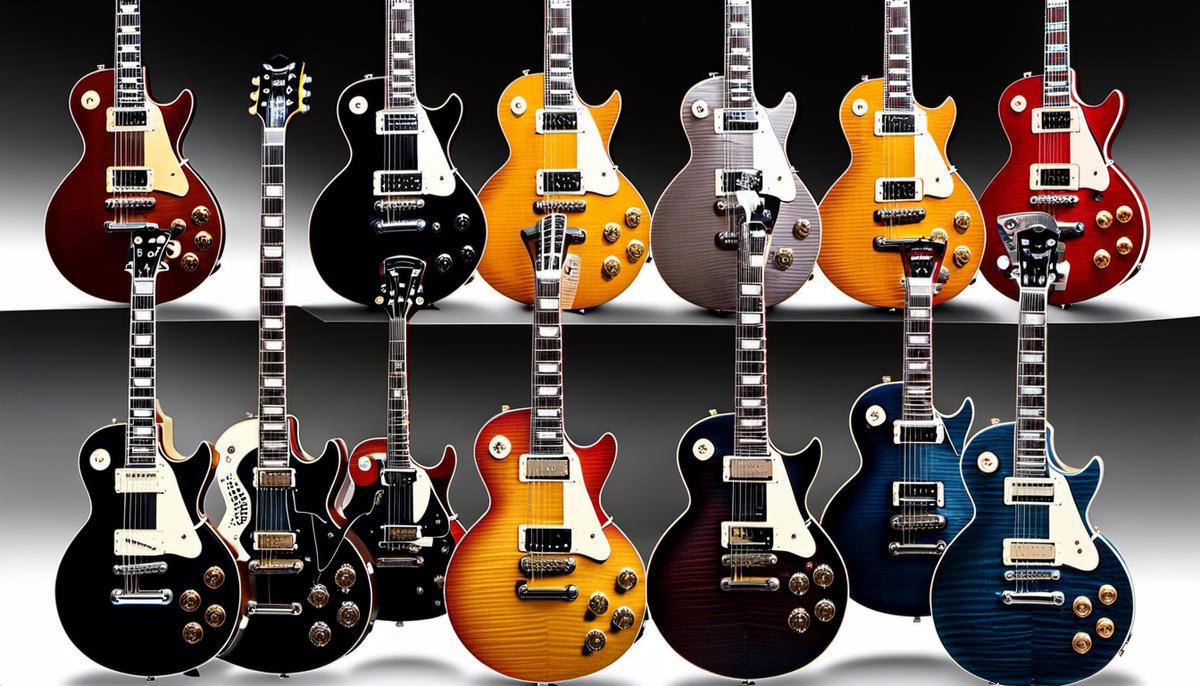
Understanding Epiphone Les Paul Pricing
Decoding the Pricing of Epiphone Les Paul Guitars
As you delve into the Epiphone Les Paul universe, you’ll notice that various factors influence the price range. These factors can be model types, materials used, age, and condition of the guitar. Familiarizing yourself with these aspects can guide you towards a more informed and discerning purchase decision when you decide to opt for an Epiphone Les Paul.
Materials and Models
First and foremost, the materials used and the specific model of the guitar have a significant impact on the price. Higher-end Epiphone Les Paul guitars are constructed with high-quality woods, such as mahogany for the body and neck, and rosewood for the fretboard. The hardware, which includes the tuning pegs, bridge, and pickups, also affect the price. High-quality hardware ensures the guitar will produce a superior sound and sustain a longer lifespan.
The model of the guitar also plays a substantial role in determining the price. For instance, the Epiphone Les Paul Standard PlusTop Pro, which boasts ProBucker pickups with coil-splitting and a stunning flame maple top, will have a higher price tag than a model with less high-end features, like the Epiphone Les Paul Special II.
Age and Condition
The age and condition of an Epiphone Les Paul also significantly influence the price. A vintage model in excellent condition can fetch a high price due to its historical value and the unique tone that aged wood provides. Alternatively, a used guitar with considerable wear and damage will typically be priced lower.
New versus Used
If you are considering a used Epiphone Les Paul, the price will generally be lower than purchasing a new one, but there are a few things to keep in mind. Used guitars may have experienced years of play, and while this can add a unique character to the instrument, it can also mean wear and tear, which might necessitate future repairs. On the other hand, buying new ensures you’re receiving a guitar in pristine condition, but it will cost more.
To Begin With…
The purchase price of an Epiphone Les Paul is greatly influenced by various factors such as the quality of materials used in its construction, the particular model, its age, and overall condition. It’s essential for potential buyers to consider these aspects, including the decision between a new or used model, when contemplating their purchase.
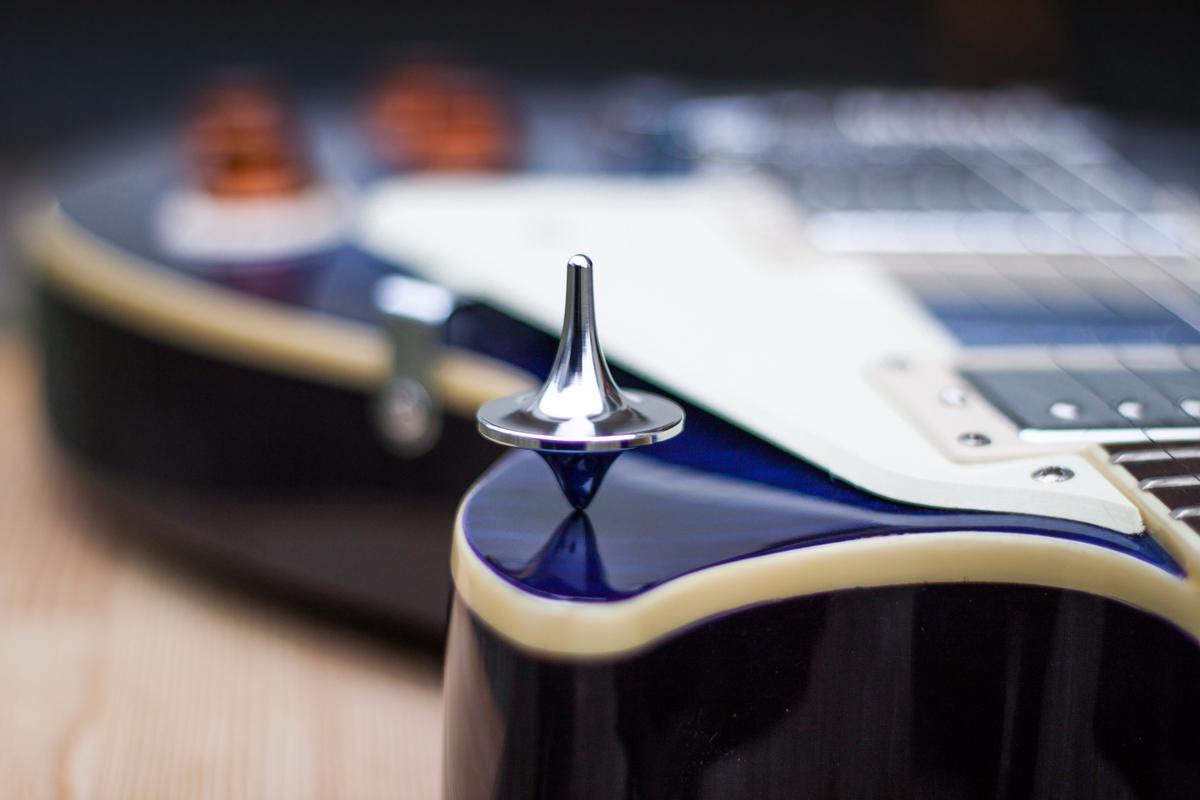
Photo by ludwig2311 on Unsplash
Where to Buy Epiphone Les Paul Guitars
Finding Your Epiphone Les Paul Online
A convenient method to acquire an Epiphone Les Paul is by shopping on reputable online platforms. Renowned websites like the official Gibson site, Guitar Center, and Sweetwater offer an array of Epiphone Les Paul models. On these sites, you can access comprehensive specifications of each model, read customer reviews, and compare prices across different models.
Amazon also offers a broad selection of Epiphone Les Paul guitars, but it’s advisable to exercise discretion due to the presence of third-party sellers. Always verify seller ratings and reviews before making a purchase to avoid fake or poorly maintained guitars.
Another option to consider is Reverb.com, a specialized online marketplace for musicians. This site offers new, used, and vintage Epiphone Les Paul guitars. Since the site is filled with musicians, sellers on Reverb are typically well-versed with the equipment and you can engage in direct conversations with them to ask specific questions about the guitar.
Where to Buy Epiphone Les Paul Guitars in Physical Stores
Physical stores also offer the advantage of being able to test and feel the guitar before making a purchase. Renowned music stores such as Guitar Center and Sam Ash offer a variety of new and used Epiphone Les Paul models. Talking to the staff can be advantageous as they can provide professional advice on the best guitar to suit your individual needs and preferences.
Pawn shops and used music equipment stores in your local area can also have second-hand Epiphone Les Paul guitars at affordable prices. However, care is needed to check the condition and authenticity of the guitar.
How To Avoid Counterfeit Epiphone Les Paul Guitars
Shopping for an Epiphone Les Paul can be an exciting process. However, it’s essential to exercise caution to avoid counterfeit or falsely advertised instruments. A crucial step is verifying the guitar’s serial number, typically placed on the rear side of the headstock. This number can be authenticated by reaching out to Gibson Guitar’s Customer Service team or by using their online serial search feature.
Identifying characteristic Les Paul features, like a maple top on a mahogany body, a set neck, and a tune-o-matic bridge, can further assist you in avoiding counterfeits. Also, keep an eye out for prices that seem too good to be true. Genuine Epiphone Les Pauls are usually priced within the range of low $100s to the high $1000s, based on the specific model and condition.
Seeking advice from a trusted guitar expert or luthier can be invaluable. These individuals can provide a detailed examination and professional opinion, potentially saving you from going ahead with a purchase of a counterfeit Les Paul guitar.
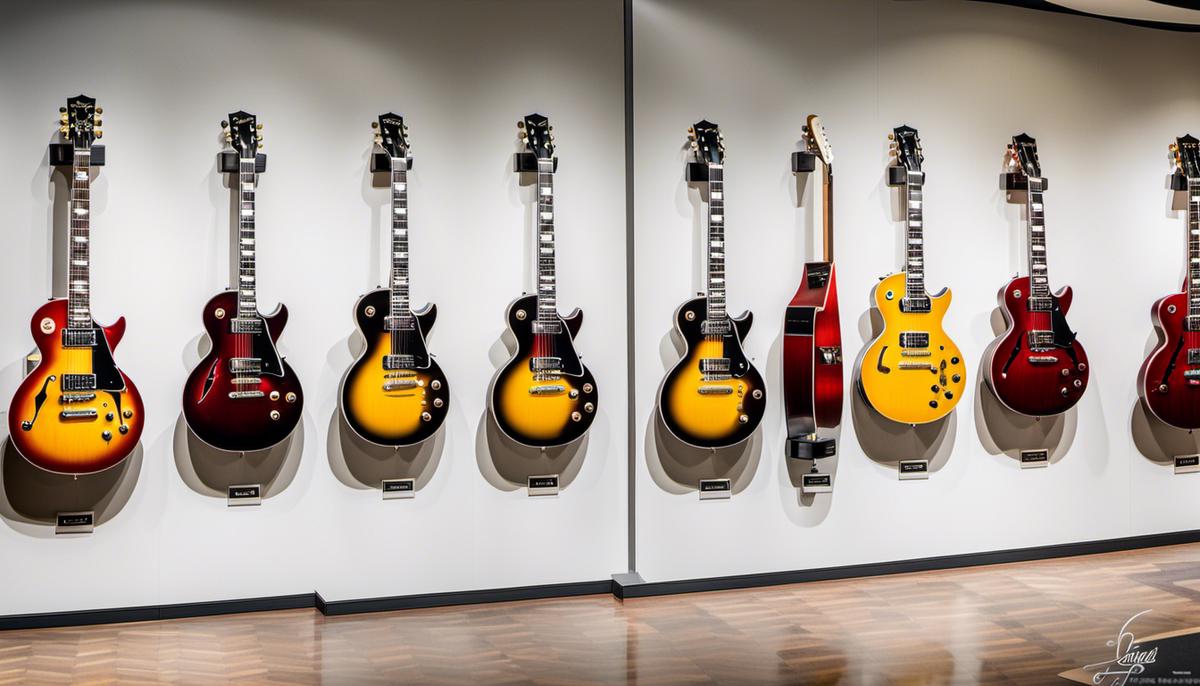
Maintaining and Caring for Your Epiphone Les Paul
Preserving Your Epiphone Les Paul: Essential Cleaning Practices
Proper cleaning and maintenance are fundamental in preserving both the aesthetic and functional aspects of your Epiphone Les Paul. Regular dusting is critical to keep dirt from accumulating on the surface. For this, always use a clean, soft, dry cloth. For stubborn dirt, a slightly damp cloth can be used, but it’s crucial to dry the instrument promptly to prevent moisture-related damage. Moreover, consider cleaning the strings after each use. This practice can extend the life of your strings by minimizing the buildup of sweat and grease, which can cause corrosion over time.
Caring for the Fretboard of the Epiphone Les Paul
The fretboard is another part of the Epiphone Les Paul that needs specific attention. Regular cleaning with a specialized fretboard cleaner is beneficial. During each string change, lightly oil the fretboard with lemon oil or a similar guitar-specific product to protect the wood and prevent it from drying out. But remember, it is not suitable for maple fretboards as it can discolor the wood.
Storage Tips for Your Epiphone Les Paul
Storing your Epiphone Les Paul properly is critical to maintain its longevity and performance. Avoid extreme temperatures or direct sunlight, which can damage the finish or warp the neck of the guitar. The best place to store your guitar is in its case in a cool, dry environment. If you’re hanging it on a wall, make sure it’s out of direct sunlight. Also, use some humidity controls if the environment is dry, as this can cause cracking and warping.
Regular Maintenance of Your Epiphone Les Paul
Regular maintenance includes changing the strings, checking and adjusting the truss rod that helps keep the neck straight, and setting the action, the distance between string and fret, to a comfortable height. Pay attention to intonation, ensuring that the guitar stays in tune across the length of the neck. If you’re not sure how to do these yourself, a professional guitar setup service can help.
Incorporating Safe Playing Habits
Playing habits also substantially influence the lifespan of your Epiphone Les Paul. Always wash your hands before playing to reduce the amount of dirt and oils your guitar is exposed to. Use a guitar strap to avoid dropping and damaging the guitar. Lastly, ensure you use the right plectrum to avoid strumming too hard, causing string breakage and indents on the body of the guitar.
Remember, caring for and maintaining your Epiphone Les Paul is an ongoing process and a fundamental part of being a responsible guitar owner. Regular maintenance will keep it sounding and looking its best, bringing you years of enjoyment.
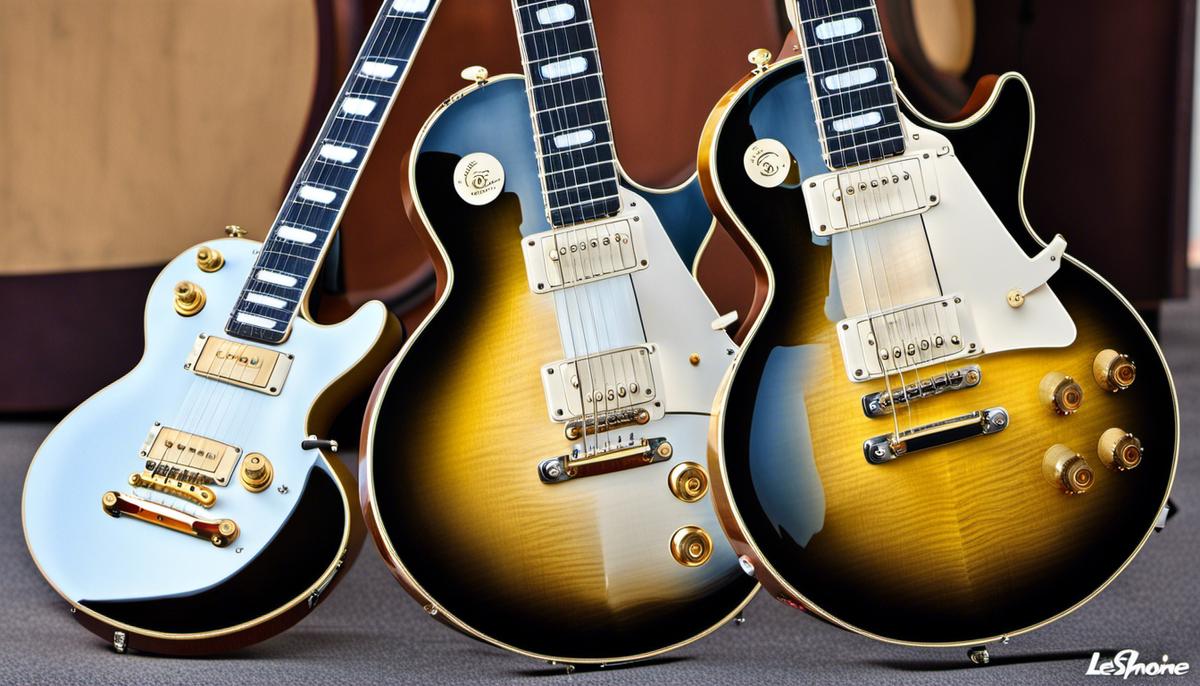
It’s clear that the allure of Epiphone Les Paul guitars lies not only in their rich history and undeniable craftsmanship but also in their capacity to tailor each model to a musician’s individual needs. One must understand the pricing dynamics, select the most relevant source for purchase, and implement the right maintenance practices to keep the guitar in pristine condition. Owning an Epiphone Les Paul is not merely about acquiring a fine instrument; it’s about embracing a legacy of music and adding your own melodies to its continuous symphony. As you strum the strings, may you find the rhythm that resonates with your soul.
Comments are closed.